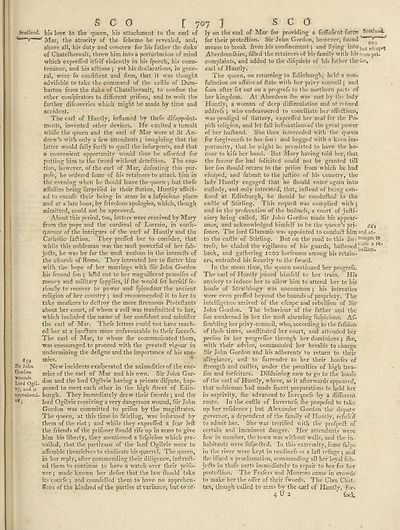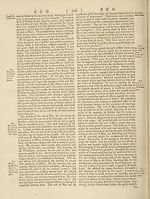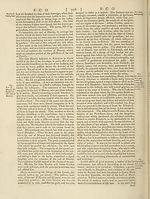Encyclopaedia Britannica, or, a Dictionary of arts, sciences, and miscellaneous literature : enlarged and improved. Illustrated with nearly six hundred engravings > Volume 18, RHI-SCR
(745) Page 707
Download files
Complete book:
Individual page:
Thumbnail gallery: Grid view | List view

Scotland,
*59
Sir John
Gordon
wounds
Lord Ogil-
Vy, and is
apprehend,
ei;
SCO f
his love to tlie queen, Ills attachinent to tlie earl
J Mar, the atrocity of the feheme he revealed, and,
above all, his duty and concern for his father the duke
of Chatelherault, threw him into a perturbation of mind
which expreffed itfelf violently in his fpeech, his coun¬
tenance, and his actions j yet his declarations, in gene¬
ral, were fo confident and firm, that it was thought
advifable to take the command of the caflle of Dum¬
barton from the duke of Chatelherault, to confine the
other confpirators to different prifons, and to wait the
farther difcoverieS which might be made by time and
accident.
The earl of Huntly, inflamed by thefe difappoint-
tnents, invented other devices. He excited a tumult
while the queen and the earl of Mar were at St An¬
drew’s with only a few attendants ; imagining that the
latter would fally forth to quell the infurgents, and that
a convenient opportunity would thus be afforded for
putting him to the fword without deteftion. The cau¬
tion, however, of the earl of Mar, defeating this pur-
pofe, he ordered fome of his retainers to attack him in
the evening when he fhould leave the queen ; but thefe
affatlins being furprifed in their ftation, Huntly affect¬
ed to excufe their being in arms in a fufpicious place
and at a late hour, by frivolous apologies, which, though
admitted, could not be approved.
About this period, too, letters were received by Mary
from the pope and the cardinal of Lorrain, in confe*
quence of the intrigues of the earl of Huntly and the
Catholic faCtion. They preffed her to confider, that
while this nobleman was the moft powerful of her fub-
jeCts, he was by far the moft zealous in the interefts of
the church of Rome. They intreated her to flatter him
with the hope of her marriage with Sir John Gordon
his fecond fon ; h£ld out to her magnificent promifes of
rnoney and military fupplies, if fhe would fet herfelf fe-
rioufly to recover to power and fplendour the ancient
religion of her country ; and recommended it to her to
take meafures to deftroy the more ftrenuous Proteftants
about her court, of whom a roll was tranfmitted to her,
wdiich included the name of her confidant and minifler
the earl of Mar. Thefe letters could not have reach¬
ed her at a junChire more unfavourable to their fuccefs.
The earl of Mar, to whom fhe communicated them,
was encouraged to proceed with the greatefl vigour in
undermining the defigns and the importance of his ene¬
mies.
New incidents exafperated the animofities of the ene¬
mies of the earl of Mar and his own. Sir John Gor¬
don and the lord Ogilvie having a private difpute, hap¬
pened to meet each other in the high ftreet of Edin¬
burgh. They immediately drew their fwords ; and the
lord Ogilvie receiving a very dangerous wound, Sir John
Gordon was committed to prifon by the magiftrates.
The queen, at this time in Stirling, w7as informed by
them of the riot 5 and while they expreffed a fear left
the friends of the prifoner fhould rife up in arms to give
him his liberty, they mentioned a fufpicion which pre¬
vailed, that the partizans of the lord Ogilvie were to
aflemble themfelves to vindicate his quarrel. The queen,
in her reply, after commending their diligence, inftruCl;-
ed them to continue to have a watch over their prifo¬
ner ; made known her defire that the law fhould take
its courfe ; and counfelled them to have no apprehen-
Sons of the kindred of the parties at variancej but fo rd-
707 3 SCO
of ly on the earl of Mar for providing a fufficient forbe Scotland.
for their proteftion. Sir John Gordon, however, found 66q
means to break from his confinement •, and flying into but efcapp^
Aberdeenfhire, filled the retainers of his family with his from pii-
complaints, and added to the dilquiets of his father the fon,
earl of Huntly.
The queen, on returning to Edinburgh, held a con-
fultation on affairs of ftate with her privy council j and
foon after fet out on a progrefs to the northern parts of
her kingdom. At Aberdeen (lie was met by the lady
Huntly, a woman of deep difiimulation and of refined
addrefs ; who endeavoured to conciliate her affebfions,
was prodigal of flattery, expreffed her zeal for the Po-
pifh religion, and let fall infinuationsof the great power
of her hufband. She then interceded with the queen
for forgivenefs to her fon : and begged with a keen im¬
portunity, that he might be peimitted to have the ho¬
nour to kifs her hand. But Mary having told her, that
the favour file had folicited could not be granted till
her fon fhould return to the prifon from which he had
efcaped, and fubmit to the juftice of his country, the
lady Huntly engaged that he fhould enter again into
cuftody, and only intreated, that, inflead of bc:ng con¬
fined at Edinburgh, he fhould be condufted to the
caftle of Stirling. This requeft was complied with j
and in the profecution of the bunnefs, a court of jufti-
ciary being called, Sir John Gordon made his appear¬
ance, and acknowledged himfelf to be the queen’s pri-
foner. The lord Glammis was appointed to conduff him and at-
to the caftle of Stirling. But on the road to this for- t€mPts
trefs, he eluded the vigilance of his guards, haftened rC'~
back, and gathering 1000 horfemen among his retain¬
ers, entrufted his fecurity to the fword.
In the mean time, the queen continued her progrefs.
The earl of Huntly joined himfelf to her train. His
anxiety to induce her to allow him to attend her to his
houfe of Stralhbogy was uncommon j his intreaties
were even preffed beyond the bounds of propriety. The
intelligence arrived of the efcape and rebellion of Sir
John Gordon. The behaviour of the father and the
fon awakened in her the moft alarming fufpicions. Af-
fembling her privy-council, who, according to the fafhion
of thofe timfes, conftituted her court, and attended her
perfon in her jwogreffes through her dominions j fhe,
with their advice, commanded her heralds to charge
Sir John Gordon and his adherents to return to their
allegiance, and to furrender to her their houfes of
ftrengtb and caftles, under the penalties of high trea-
fon and forfeiture. Difdaining now to go to the houfe
of the earl of Huntly, where, as it afterwards appeared,
that nobleman had made fecret preparations to hold her
in captivity, fhe advanced to Inveunefs by a different
route. In the caftle of Invernefs me propofed to take
up her refidence ; but Alexander Gordon the deputv
governor, a dependent of the family of Huntly, refuftd
to admit her. She was terrified with the profpeift of
certain and imminent danger. Her attendants were
few in number, the town was without walls, and the in¬
habitants were fufpefted. In this extremity, fome (hips
in the river were kept in readinefs as a laft refuge; and
(lie iffued a proclamation, commanding all her loyal fub-
jefta in thofe parts immediately to repair to her for lief
proteflion. The Erafers and Monroes came in crowds
to make her the offer of their fwords. The Clan Chat-
tan, though called to arms by the carl of Huntly, for-
4 U 2 lock
*59
Sir John
Gordon
wounds
Lord Ogil-
Vy, and is
apprehend,
ei;
SCO f
his love to tlie queen, Ills attachinent to tlie earl
J Mar, the atrocity of the feheme he revealed, and,
above all, his duty and concern for his father the duke
of Chatelherault, threw him into a perturbation of mind
which expreffed itfelf violently in his fpeech, his coun¬
tenance, and his actions j yet his declarations, in gene¬
ral, were fo confident and firm, that it was thought
advifable to take the command of the caflle of Dum¬
barton from the duke of Chatelherault, to confine the
other confpirators to different prifons, and to wait the
farther difcoverieS which might be made by time and
accident.
The earl of Huntly, inflamed by thefe difappoint-
tnents, invented other devices. He excited a tumult
while the queen and the earl of Mar were at St An¬
drew’s with only a few attendants ; imagining that the
latter would fally forth to quell the infurgents, and that
a convenient opportunity would thus be afforded for
putting him to the fword without deteftion. The cau¬
tion, however, of the earl of Mar, defeating this pur-
pofe, he ordered fome of his retainers to attack him in
the evening when he fhould leave the queen ; but thefe
affatlins being furprifed in their ftation, Huntly affect¬
ed to excufe their being in arms in a fufpicious place
and at a late hour, by frivolous apologies, which, though
admitted, could not be approved.
About this period, too, letters were received by Mary
from the pope and the cardinal of Lorrain, in confe*
quence of the intrigues of the earl of Huntly and the
Catholic faCtion. They preffed her to confider, that
while this nobleman was the moft powerful of her fub-
jeCts, he was by far the moft zealous in the interefts of
the church of Rome. They intreated her to flatter him
with the hope of her marriage with Sir John Gordon
his fecond fon ; h£ld out to her magnificent promifes of
rnoney and military fupplies, if fhe would fet herfelf fe-
rioufly to recover to power and fplendour the ancient
religion of her country ; and recommended it to her to
take meafures to deftroy the more ftrenuous Proteftants
about her court, of whom a roll was tranfmitted to her,
wdiich included the name of her confidant and minifler
the earl of Mar. Thefe letters could not have reach¬
ed her at a junChire more unfavourable to their fuccefs.
The earl of Mar, to whom fhe communicated them,
was encouraged to proceed with the greatefl vigour in
undermining the defigns and the importance of his ene¬
mies.
New incidents exafperated the animofities of the ene¬
mies of the earl of Mar and his own. Sir John Gor¬
don and the lord Ogilvie having a private difpute, hap¬
pened to meet each other in the high ftreet of Edin¬
burgh. They immediately drew their fwords ; and the
lord Ogilvie receiving a very dangerous wound, Sir John
Gordon was committed to prifon by the magiftrates.
The queen, at this time in Stirling, w7as informed by
them of the riot 5 and while they expreffed a fear left
the friends of the prifoner fhould rife up in arms to give
him his liberty, they mentioned a fufpicion which pre¬
vailed, that the partizans of the lord Ogilvie were to
aflemble themfelves to vindicate his quarrel. The queen,
in her reply, after commending their diligence, inftruCl;-
ed them to continue to have a watch over their prifo¬
ner ; made known her defire that the law fhould take
its courfe ; and counfelled them to have no apprehen-
Sons of the kindred of the parties at variancej but fo rd-
707 3 SCO
of ly on the earl of Mar for providing a fufficient forbe Scotland.
for their proteftion. Sir John Gordon, however, found 66q
means to break from his confinement •, and flying into but efcapp^
Aberdeenfhire, filled the retainers of his family with his from pii-
complaints, and added to the dilquiets of his father the fon,
earl of Huntly.
The queen, on returning to Edinburgh, held a con-
fultation on affairs of ftate with her privy council j and
foon after fet out on a progrefs to the northern parts of
her kingdom. At Aberdeen (lie was met by the lady
Huntly, a woman of deep difiimulation and of refined
addrefs ; who endeavoured to conciliate her affebfions,
was prodigal of flattery, expreffed her zeal for the Po-
pifh religion, and let fall infinuationsof the great power
of her hufband. She then interceded with the queen
for forgivenefs to her fon : and begged with a keen im¬
portunity, that he might be peimitted to have the ho¬
nour to kifs her hand. But Mary having told her, that
the favour file had folicited could not be granted till
her fon fhould return to the prifon from which he had
efcaped, and fubmit to the juftice of his country, the
lady Huntly engaged that he fhould enter again into
cuftody, and only intreated, that, inflead of bc:ng con¬
fined at Edinburgh, he fhould be condufted to the
caftle of Stirling. This requeft was complied with j
and in the profecution of the bunnefs, a court of jufti-
ciary being called, Sir John Gordon made his appear¬
ance, and acknowledged himfelf to be the queen’s pri-
foner. The lord Glammis was appointed to conduff him and at-
to the caftle of Stirling. But on the road to this for- t€mPts
trefs, he eluded the vigilance of his guards, haftened rC'~
back, and gathering 1000 horfemen among his retain¬
ers, entrufted his fecurity to the fword.
In the mean time, the queen continued her progrefs.
The earl of Huntly joined himfelf to her train. His
anxiety to induce her to allow him to attend her to his
houfe of Stralhbogy was uncommon j his intreaties
were even preffed beyond the bounds of propriety. The
intelligence arrived of the efcape and rebellion of Sir
John Gordon. The behaviour of the father and the
fon awakened in her the moft alarming fufpicions. Af-
fembling her privy-council, who, according to the fafhion
of thofe timfes, conftituted her court, and attended her
perfon in her jwogreffes through her dominions j fhe,
with their advice, commanded her heralds to charge
Sir John Gordon and his adherents to return to their
allegiance, and to furrender to her their houfes of
ftrengtb and caftles, under the penalties of high trea-
fon and forfeiture. Difdaining now to go to the houfe
of the earl of Huntly, where, as it afterwards appeared,
that nobleman had made fecret preparations to hold her
in captivity, fhe advanced to Inveunefs by a different
route. In the caftle of Invernefs me propofed to take
up her refidence ; but Alexander Gordon the deputv
governor, a dependent of the family of Huntly, refuftd
to admit her. She was terrified with the profpeift of
certain and imminent danger. Her attendants were
few in number, the town was without walls, and the in¬
habitants were fufpefted. In this extremity, fome (hips
in the river were kept in readinefs as a laft refuge; and
(lie iffued a proclamation, commanding all her loyal fub-
jefta in thofe parts immediately to repair to her for lief
proteflion. The Erafers and Monroes came in crowds
to make her the offer of their fwords. The Clan Chat-
tan, though called to arms by the carl of Huntly, for-
4 U 2 lock
Set display mode to:
![]() Universal Viewer |
Universal Viewer | ![]() Mirador |
Large image | Transcription
Mirador |
Large image | Transcription
Images and transcriptions on this page, including medium image downloads, may be used under the Creative Commons Attribution 4.0 International Licence unless otherwise stated. ![]()
| Permanent URL | https://digital.nls.uk/193028392 |
|---|
| Attribution and copyright: |
|
|---|
| Description | Ten editions of 'Encyclopaedia Britannica', issued from 1768-1903, in 231 volumes. Originally issued in 100 weekly parts (3 volumes) between 1768 and 1771 by publishers: Colin Macfarquhar and Andrew Bell (Edinburgh); editor: William Smellie: engraver: Andrew Bell. Expanded editions in the 19th century featured more volumes and contributions from leading experts in their fields. Managed and published in Edinburgh up to the 9th edition (25 volumes, from 1875-1889); the 10th edition (1902-1903) re-issued the 9th edition, with 11 supplementary volumes. |
|---|---|
| Additional NLS resources: |
|

